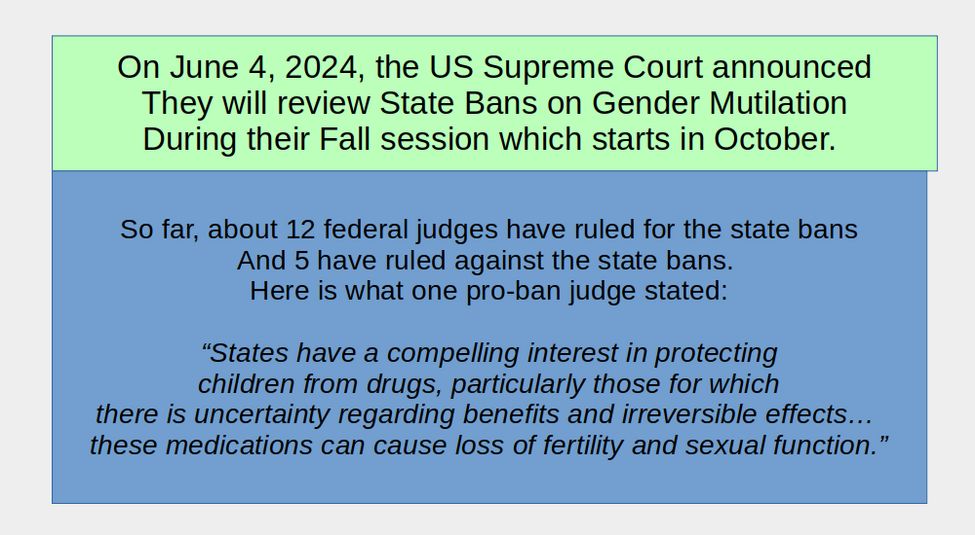23 Supreme Court to review state bans on gender mutilation of minors
On June 24, 2024, the US Supreme Court announced that they will review state bans on gender-affirming care for minors (more accurately called gender mutilation of minors) during their Fall session in October. The court will consider the constitutionality of state laws that restrict or ban gender-mutilation of minors, including hormone therapy and surgeries.
The specific case they will review involves a Tennessee law that prohibits healthcare providers from administering puberty blockers, hormones, and surgeries to minors. The law was challenged by the Biden administration, who argue that it violates the equal protection clause of the 14th Amendment and the due process clause of the 14th Amendment as well as a 2020 US Supreme Court decision called Bostock v. Clayton County.
While the lower court had applied the Supreme Court’s 2020 decision...to equate “gender identity” with “sex” as used in Title VII, the 6th Circuit Court of Appeals disagreed concluding that the Supreme Court 2020 decision was limited to job discrimination of adults and therefore did not apply to gender mutilation via giving experimental drugs to minors. In a two to one vote on July 8, 2023, the 6th Circuit held that the Tennessee state law did not violate either parents’ constitutional right to direct the upbringing of their children or constitutional protections that require all individuals to be treated equally regardless of sex. Here is a link to the 6th Circuit ruling: https://www.opn.ca6.uscourts.gov/opinions.pdf/23a0146p-06.pdf
Here is a quote from their decision:
“Parents, it is true, have a substantive due process right “to make decisions concerning the care, custody, and control of their children.” Troxel v. Granville, 530 U.S. 57, 66 (2000). But the Supreme Court cases recognizing this right confine it to narrow fields, such as education, Meyer v. Nebraska, 262 U.S. 390 (1923), and visitation rights, Troxel, 530 U.S. 57. No Supreme Court case extends it to a general right to receive new medical or experimental drug treatments.“
The above Court of Appeals ruling caused a Kentucky Federal court to rule in favor of Kentucky ban on gender mutilation of minors.
On August 21, 2023, the 11th Circuit Court of Appeals issued a similar opinion, voting three to zero in favor of a similar Alabama state ban.
Here is a link to their 59 page opinion.
https://media.ca11.uscourts.gov/opinions/pub/files/202211707.pdf
Here is a quote: “States have a compelling interest in protecting children from drugs, particularly those for which there is uncertainty regarding benefits, recent surges in use, and irreversible effects… these medications can cause loss of fertility and sexual function.”
In a similar ruling, on August 25, 2023, a federal court upheld the constitutionality of a Missouri law banning giving gender mutilation drugs to minors. Here is a link to this ruling: https://ago.mo.gov/wp-content/uploads/sb-49-order.pdf?sfvrsn=1a3d0aea_2
In February, 2024, a three judge panel of the 7th Circuit of the Court of Appeals also held for the state of Indiana ban. They said they would issue an opinion at some point in the future but as of June 2024, they have not issued an opinion – just a decision.
On November 16, 2022, in a 6 to 5 decision, the 8th Circuit has blocked a gender affirming care ban in Arkansas.
https://fingfx.thomsonreuters.com/gfx/legaldocs/byprljlzrpe/Brandt%20v%20Rutledge%20en%20banc%20denial%2011-16.pdf
In December 2023, a 9th Circuit three judge panel blocked a gender affirming care ban in Idaho. However, on April 15, 2024, the US Supreme Court by a vote of 6 to 3 granted Idaho Attorney General Raúl Labrador’s (R) request to narrow a December district court order blocking the state’s ban in its entirety, allowing the law to be enforced against individuals other than the two transgender teenagers challenging it in court.
As we noted earlier in this report, a court in Texas ruled in favor of the state ban while a court in Florida ruled against the state ban. There are at least 7 more federal courts that may issue opinions before the Supreme Court hears the case in October. But so far, there are about 12 federal judges ruling for State bans and 5 federal judges ruling against state bans. In addition, there are about 27 state attorney generals in favor of state bans and 16 attorney generals (including the Washington state attorney general) who have submitted briefs opposing the state bans.

My prediction is that the US Supreme Court will rule 6 to 3 that the 2020 US Supreme Court decision called Bostock v. Clayton County does not apply to gender mutilation bans of minors.
A ruling in favor of the states will allow them to continue restricting or banning gender mutilation of minors, which will likely lead to a patchwork of state by state laws across the US. As voters learn more about how “gender-affirming drugs” have serious adverse consequences, they will vote against the corrupt politicians who support this drug abuse and vote in favor of politicians who support protecting minors from gender mutilation drug peddlers.
Hopefully, some day the truth will come out and those who committed this crime against our kids will be held accountable for the lies they told and the damage they inflicted on our children.
